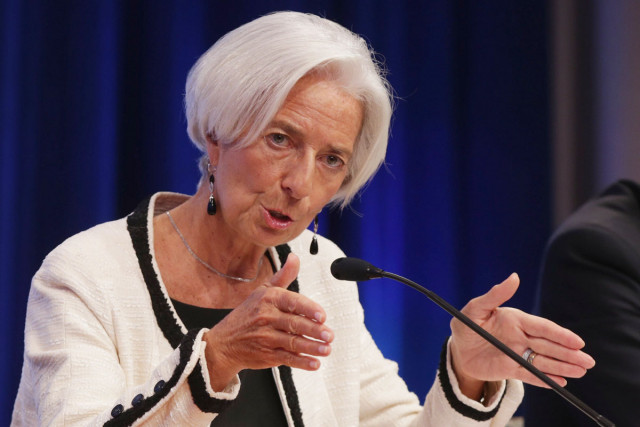IMF revamps its lending and support for poor countries
An estimated $2 trillion to $3 trillion in new investment is needed to achieve the United Nation's bold agenda

"This year marks a once-in-a-generation opportunity for global development," LaGarde said in a speech prepared for delivery at the Brookings Institution in Washington. PHOTO: AFP
IMF Managing Director Christine Lagarde announced the changes on Wednesday ahead of a United Nations conference next week on how to finance development when global growth is slowing and foreign aid budgets shrinking.
"This year marks a once-in-a-generation opportunity for global development," LaGarde said in a speech prepared for delivery at the Brookings Institution in Washington.
An estimated $2 trillion to $3 trillion in new investment is needed to achieve the United Nation's bold agenda, which world leaders are due to adopt in September. It has drawn up 17 Sustainable Development Goals on everything from ending hunger and poverty to achieving gender equality and making cities sustainable and safe by 2030.
These goals, along with climate change which will come up for debate by year's end, present significant financing challenges.
While the IMF's primary role is as emergency lender, Lagarde laid out a series of measures designed to support low-income countries as they pursue faster and more equitable economic development.
It expanded the borrowing limit on its low-interest and interest-free loans, which 73 poor countries are eligible to receive, from 300 percent of their IMF quota to 450 per cent. It also lengthened the repayment period on zero-interest loans for fragile states and countries hit by natural disasters.
The IMF coupled this with organizational changes to focus more staff resource on technical advice and training in the following areas:
* Taxation: Tax collection is less than 15 per cent of GDP in almost half the developing countries against 34 per cent in OECD countries. The IMF said it will work with developing countries on improving tax systems and would represent their interests in international talks to revamp global corporate tax rules.
* Infrastructure: the World Bank estimates there is $1 trillion a year shortfall in infrastructure investment in developing countries, while IMF research shows that 30 per cent of potential gains from public investment is lost. The IMF will work more closely with countries on infrastructure strategies.
* Financial inclusion: The IMF will expand its analytical work on income inequality, gender, youth and access to finance for marginalised people as a means to raise GDP.
"In these concrete ways, the IMF intends to create a more supportive environment for developing countries to prosper in the period ahead. We will play our part," Lagarde said.



















COMMENTS
Comments are moderated and generally will be posted if they are on-topic and not abusive.
For more information, please see our Comments FAQ